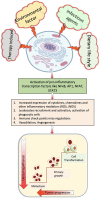Neglected Agent Eminent Disease: Linking Human Helminthic Infection, Inflammation, and Malignancy
- PMID: 31867284
- PMCID: PMC6909818
- DOI: 10.3389/fcimb.2019.00402
Neglected Agent Eminent Disease: Linking Human Helminthic Infection, Inflammation, and Malignancy
Abstract
Helminthic parasitic infection is grossly prevalent across the globe and is considered a significant factor in human cancer occurrence induced by biological agents. Although only three helminths (Schistosoma haematobium, Clonorchis sinensis, and Opisthorchis viverrini) so far have been directly associated with carcinogenesis; there are evidence suggesting the involvement of other species too. Broadly, human helminthiasis can cause chronic inflammation, genetic instability, and host immune modulation by affecting inter- and intracellular communications, disruption of proliferation-anti-proliferation pathways, and stimulation of malignant stem cell progeny. These changes ultimately lead to tumor development through the secretion of soluble factors that interact with host cells. However, the detailed mechanisms by which helminths introduce and promote malignant transformation of host cells are still not clear. Here, we reviewed the current understanding of immune-pathogenesis of helminth parasites, which have been associated with carcinogenesis, and how these infections initiate carcinogenesis in the host.
Keywords: cancer; chronic inflammation; helminths; immune modulation; parasite.
Copyright © 2019 Arora, Kaur, Anjum, Tripathi, Mishra, Kumar and Prasad.
Figures



References
-
- Aravindhan V., Mohan V., Surendar J., Muralidhara R. M., Pavankumar N., Deepa M., et al. (2010). Decreased prevalence of lymphatic filariasis among diabetic subjects associated with a diminished pro-inflammatory cytokine response (CURES 83). PLoS Negl. Trop. Dis. 4: e707. 10.1371/journal.pntd.0000707 - DOI - PMC - PubMed
-
- Assunção L. S., Magalhães K. G., Carneiro A. B., Molinaro R., Almeida P. E., Atella G. C., et al. (2017). Schistosomal-derived lysophosphatidylcholine triggers M2 polarization of macrophages through PPARγ dependent mechanisms. Biochim. Biophys. Acta. 62, 246–254. 10.1016/j.bbalip.2016.11.006 - DOI - PubMed
Publication types
MeSH terms
LinkOut - more resources
Full Text Sources

